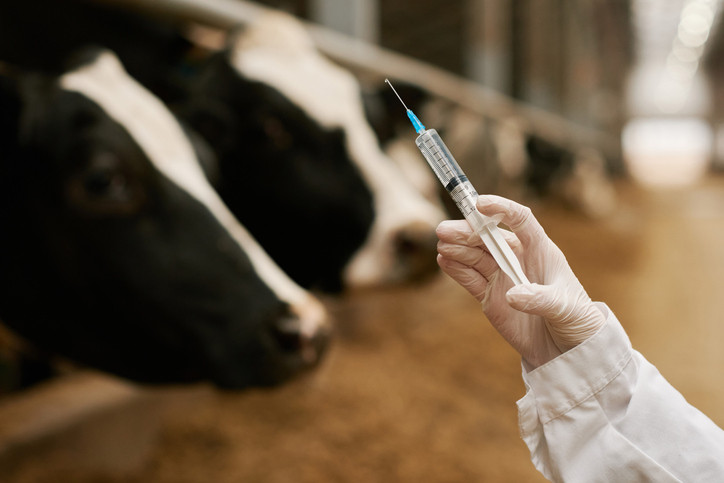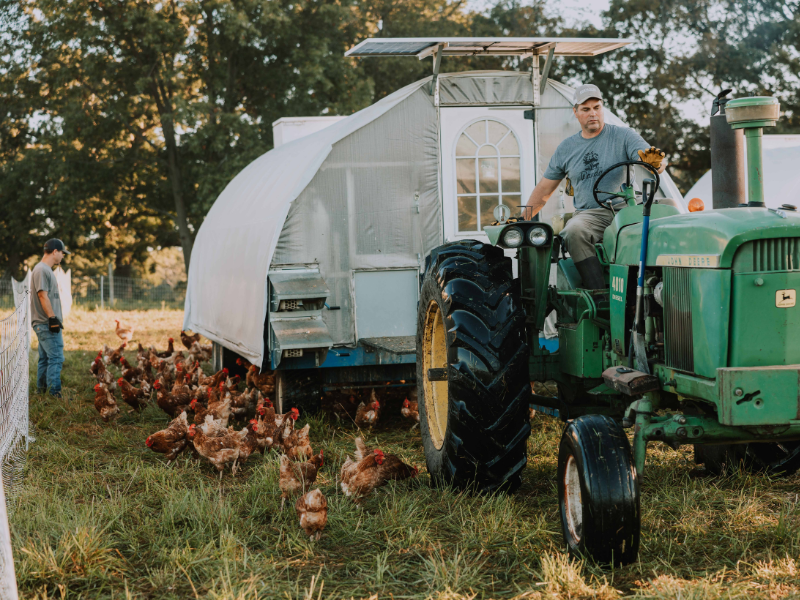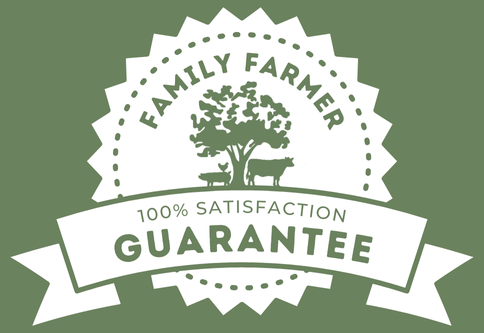mRNA Use in Agriculture
posted on
April 30, 2023
Big Pharma’s mRNA vaccine arrives in Agriculture
It is evident that our farm serves some of the most informed consumers.
When I'm just busy farming…
I receive text messages, dm's, and emails sharing concerns about new technology or recent food health concerns….
All well before I knew the issue existed!
Last month, we were overwhelmed with inquiries concerned about the use of mRNA vaccines in our livestock.
Short answer:
We don't use mRNA here on our farm....
and don't foresee ever using this technology in the future....
Period
Recent reports in the last months shared mRNA vaccine technology is being developed and already being used in hog livestock agriculture.
Leaving many consumers concerned about their food source.
I set out to do more research on this topic and take an unbiased view, but quickly realized this could turn into a college thesis with how deep the topic could go. I'm not a doctor and won't claim to have it figured out, the science behind mRNA technology is a bit over my head. For now, let's just stick to some basic facts that I found and I encourage everyone to spend the time researching it for yourself to make your own decision whether this technology is safe or not.
Ultimately, our view is to serve health conscious consumers and if our customers are skeptics, then we will avoid it at all costs, just as we have taken a stance against GMOs, glyphosate, antibiotics, and other questionable food technology.
THIS IS NOT A POLITICAL STANCE AGAINST SCIENCE. Believe me when it comes to new technology, I am all for improving our well being and making life better. I'd be Amish and not writing this email, if I didn't believe in new technology advancements.
When did mRNA vaccines arrive?
While vaccines have been around for decades, the mRNA is new to the game of agriculture and creating quite the stir of controversy.
It is stated that mRNA vaccines started being researched a decade ago and first used in 2015 on clinical trials with hogs.
However, it wasn’t until the beginning of this year that it became a hot topic, as it started to go viral on social media and many raised concerns.
Part of the popularity on social media was due to many state lawmakers raising their concerns.
I found an article explaining more of their concerns thanks to reporter, Kevin Killough
Lawmakers in Arizona, Idaho, and Missouri have introduced legislation related to the use of mRNA vaccines in food. The Arizona bill only restricts labeling such food as organic. The Idaho bill amends state law to prohibit the sale of such foods unless conspicuously labeled that the presence of the vaccine is in the food. The Missouri bill requires a conspicuous "Gene Therapy Product" label.
Missouri State Rep. Holly Jones, who sponsored the Missouri bill, said it doesn't ban the use of the vaccines, but informs consumers if it was used.
"The public deserves to understand what is in their food supply," Jones said.
She said that mRNA technology is being used without the right amount of studies on safety and efficacy, and she doesn't think the "gene therapy" label would be problematic. Jones said that we already have labels we put on products, such as "grass-fed beef" and "non-GMO."
"There needs to be something specific to gene therapy labeling, especially when it comes to our food supply," Jones said. "We have to be specific enough that people understand what they're putting in their body. I believe consumers deserve to have that information."
Jones said that her bill would support farmers who would become vulnerable to lawsuits without those labels.
"This is actually pro-business," Jones said. (Source found here)
What are mRNA vaccines?
Vaccines are nothing new, in fact they have been around for a long time and the first one was developed in 1796. It is a substance used to stimulate immunity to a particular infectious disease or pathogen, typically prepared from an inactivated or weakened form of the causative agent or from its constituents or products.
Vaccines in the past have fallen into 2 main categories.
1. MLV (modified live virus) or killed virus. Which worked by injecting a small amount of the virus into the body to create an immune response from the body and form memory cells to fight it in the future.
2.Toxoid vaccines use a toxin (harmful product) made by the germ that causes a disease. They create immunity to the parts of the germ that cause a disease instead of the germ itself. That means the immune response is targeted to the toxin instead of the whole germ.
However, the mRNA vaccines are something new that I expect to take quick adoption in the vaccine world as the technology speeds up the development process and is claimed to be much less expensive to produce.
An mRNA vaccine is different because it uses a copy of a molecule called messenger RNA to produce the immune response. In theory, after the laboratory mRNA is injected into the body, it sends a code to the cells to produce a protein that mimics the virus. This protein then stimulates an immune response and creates antibodies against the virus.
Currently, I found that mRNA vaccine technology is only available for pigs, dogs, and cats. It is not licensed for beef or poultry at this time. (found here)

Should we be concerned?
Many are concerned about this new technology and its long term effects.
1. Will it have negative side effects to the health of the animal long-term?
The FDA/USDA assure that it is completely safe to use and won't have negative long term health effects on the animal's health.
2. Will we be ingesting this mRNA when consuming meat from mRNA vaccinated animals?
They also share that the mRNA will denature in the body after a few days. Most vaccines already have meat withdrawal periods of 30-60 days (animals can't be processed for consumption after withdrawal period) on their product labels, so I anticipate a similar withdrawal period for the mRNA also. Claims are also made that ingesting the mRNA would not survive the acid stomach environment and there's no need to be concerned about this either. However, supposedly they are working on creating an edible mRNA vaccine through plants (Link here). So maybe it has a longer life period than they claim? This is where I think all of it gets over my head.
Here's 2 scientists below that are on opposing sides that have both been scrutinized for being paid off. Click on the link below and listen to both and decide on your own.
Dr. Malone claims mRNA needs more research
Dr. Folta claims mRNA is safe
I do pray and hope that this technology is safe and the hype is for naught.
Does Wanda Farm Use mRNA vaccine?
As I stated above, we have never used mRNA technology nor will ever in the foreseeable future.
Full transparency on all other vaccines.
I don’t have a stance against or for them. I think it depends on each farmer’s situation.
Currently:
All our chickens are not vaccinated from start to finish.
All our hogs are not vaccinated from start to finish.
Almost all our beef cattle are not vaccinated.
I say almost because we work with several different cow/calf farmers that raise calves for us (all to our strict grass-fed only standards). “No vaccines” has never been a requirement for our farm partners. While the majority choose not to vaccinate, I do have one farmer that chooses to vaccinate for a respiratory bacteria to his calves at weaning (it’s the old technology of MLV, not the mRNA).
Also will note, I have not been required or do I know of any farmers that have been mandated to use this new vaccine technology.
I do believe this will be an independent decision for each farmer, but most likely will be accepted with open arms to the industry.
I think overall the farm industry is pretty receptive to new biotechnology.
Why do we choose not to vaccinate?
There’s really 2 main reasons we choose not to vaccinate our livestock.
First, what type of farm do you think these vaccines are going to benefit the most?
Obviously the industrial, factory farms need these vaccines.
The livestock at these factory farms are raised in enclosed buildings with poor ventilation, in their own feces, un-natural diets, and many times under stressful environments.
All weakening their immune system and creating susceptibility to disease.
Not to mention they are crowded in the buildings, so disease can quickly spread from animal to animal.
Not to blame these farms, they are under so much economic pressure to prevent livestock sickness, that vaccines will be a viable option for them.
For our farm, we raise our livestock in a natural environment outside on pasture.
That said, we feel there’s not near the same disease pressure our livestock experience outside.
They have better air quality, cleaner environment, more vitamin D, natural diet, and a less stressful atmosphere.
All this said, when they do get exposed to a pathogen, they have a stronger immune system to fight it off!
We will also offer our cattle a free choice mineral and salt to help boost their immune system.
This is really the main reason I choose not to vaccinate our livestock.
The second reason follows my first.
What’s the economic benefit?
If our animals are healthy, why give money to big pharma for a vaccine that’s not necessary?
Not to mention the whole process and time of catching the animals to give shots is neither enjoyable for us or the animals.

Animal Husbandry all starts with prevention and that means giving our livestock a low stress and natural environment as nature intended.
Summary
I am very thankful for all the technological advancements in science and medicine. They all have helped make our lives easier and better, however, not everything is black and white.
I encourage everyone of you as consumers to spend time researching this mRNA technology yourself and make you voice to legislation that you want them to regulate this in our food system.
You deserve to know how your food was produced.
Our farm will continue to be skeptics of new bio technologies and listen to our customers' concerns.
We seek to honor God’s creation and feed families safe, healthy, nutritious food.
God Bless,
Farmer Joe




